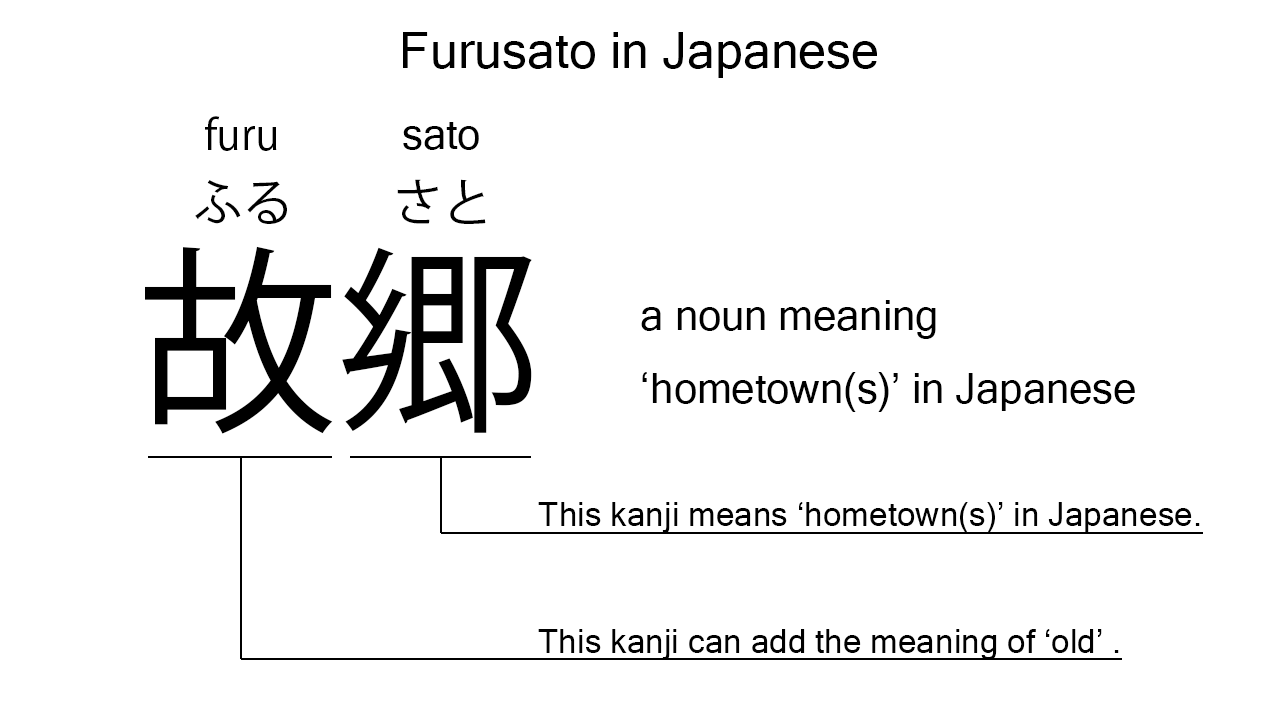What does “furusato” mean in Japanese?
Native speakers say “furusato” to mean ‘hometown’ in Japanese. Perhaps, some Japanese learners know this word as it is sometimes used in Japanese movies, songs, novels, manga, anime, and the like. In this blog post, however, I will explain this word in detail based on its kanji expression. And also, I will explain how to use it through example sentences. My explanations would help Japanese learners understand “furusato” more clearly. Then, let’s get started!
Contents
Definition and meaning of “furusato”
Let me start with the definition and meaning of “furusato”.
- furusato – 故郷 (ふるさと) : a noun meaning ‘hometown’ in Japanese. This can also work as plural. Learn more about Japanese plural.
The definition and meaning are simple and clear. To understand this noun more clearly, however, let me explain its kanji characters in detail, one by one.
Furusato in kanji
The kanji expression of “furusato” consists of the following two kanji characters:
- 故 : a kanji character sometimes used as a prefix to add the meaning of ‘old’.
- 郷 : a kanji character used to mean ‘hometown’ in Japanese.
These two kanji characters tell us that the formed noun literally means an ‘old hometown’ in Japanese. This literal interpretation is more or less in line with the actual meaning.

When we meet new kanji expressions, we should check their kanji characters in detail to understand their meanings clearly and deeply. In many cases, kanji characters tell us a lot about the meanings of the expressions they form. Actually, here, we could get the better understanding of “furusato” through the detailed kanji check above.
So far, I’ve explained the definition and meaning of “furusato” together with its kanji characters. Then, let me explain how to use it through the example sentences.
Example #1: how to say “hometown” in Japanese
tokyo ga watashi no furusato desu – 東京が私の故郷です (とうきょうがわたしのふるさとです)
Tokyo is my hometown.
Below are the new words used in the example sentence.
- tokyo – 東京 (とうきょう) : a noun meaning ‘Tokyo’ in Japanese.
- ga – が : a case particle used to make the subject word or the object word in a sentence. In the example, this is used after “tokyo” to make the subject in the sentence.
- watashi – 私 (わたし) : a pronoun meaning ‘I’ in Japanese.
- no – の : a case particle used after a noun or pronoun to make its possessive case. In the example, this is used after “watashi” to make its possessive case, “watashi no“, which means ‘my’ in Japanese.
- desu – です : an auxiliary verb used after a noun or adjective to make it polite. Probably, this is well known as a part of Japanese desu form. In the example, this is used after “watashi no furusato” to make it sound polite.
This is a typical usage of “furusato”. In this example, it works together with the possessive case, “watashi no”, to mean ‘my hometown’ in Japanese.
Example #2: another usage of “furusato”
furusato wa itsumo kokoro no naka ni aru – 故郷はいつも心の中にある (ふるさとはいつもこころのなかにある)
My hometown is always in my mind.
Below are the new words used in the example sentence.
- wa – は : a binding particle working as case marker or topic marker. In the example, this works after “furusato” to make the subject in the sentence.
- itsumo – いつも : an adverb of frequency meaning ‘always’ in Japanese.
- kokoro – 心 (こころ) : a noun meaning ‘mind’ or such in Japanese. This can also work as plural.
- no – の : a case particle joining two nouns. Normally, the first one can work as a modifier to describe the second. In the example, this works to join “kokoro” and “naka”. The formed phrase literally means ‘the inside of my heart’ in Japanese.
- naka – 中 (なか) : a noun meaning ‘inside’ in Japanese.
- ni – に : a case particle used to say where someone or something is. In the example, this is used after “kokoro no naka” to say where the speaker’s hometown is.
- aru – ある : a verb meaning ‘to be’, ‘to exist’, or such in Japanese.
This is another typical usage of “furusato”. In this example, it works together with the binding particle, “wa”, to become the subject in the sentence. When we want to mean a ‘hometown’ in Japanese, anyway, “furusato” is always a very good option.
Summary
In this blog post, I’ve explained the definition and meaning of “furusato” in detail based on its kanji expression. And also, I’ve explained how to use it through the example sentences. Let me summarize them as follows.
- furusato – 故郷 (ふるさと) : a noun meaning ‘hometown’ in Japanese. This can also work as plural. These two kanji characters literally mean an ‘old hometown’ in Japanese. This literal interpretation is more or less in line with the actual meaning.
Hope my explanations are understandable and helpful for Japanese learners.